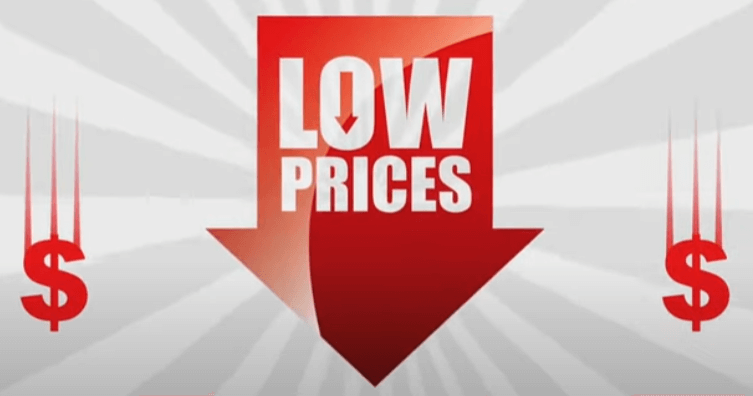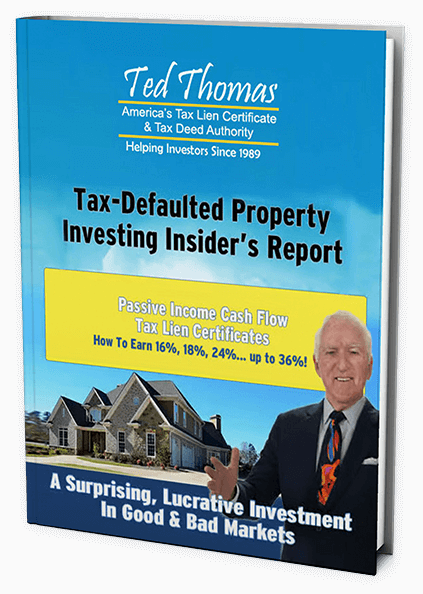While some may think that investing in real estate during recession isn’t possible or wise – there are ways you can make smart investments with tax lien certificates and tax deeds regardless of the current market conditions.
Today we’ll explore whether the real estate industry is truly “recession-proof” as well as look into different methods on how best to prepare for investing in these types of properties before an economic crisis hits.
Table of Contents:
Tax-Defaulted Real Estate During Recession: What to Know
Tax-defaulted real estate during a recession can be an attractive investment opportunity for those looking to make the most of their money. It’s important to understand the differences between investing in tax lien certificates and tax deed properties, as well as how to prepare for investing in real estate during a recession.
Tax Lien Certificates:
A tax lien certificate is issued when real estate owners fail to pay property taxes. The investor who purchases the certificate then has a legal claim against the property until the delinquent taxes are paid off.
When purchasing a tax lien certificate, investors should research local laws and regulations regarding foreclosure procedures and redemption periods, which vary from state to state. Investors should also consider whether they’re willing to take ownership of the property if necessary, since this may involve additional costs.
Tax Deeds:
Investing in tax deeds involves buying properties that have been seized by local governments due to unpaid taxes. This type of investment requires more capital than investing in tax liens but offers higher returns and has no redemption period after purchase.
Before making any investments, research local laws regarding foreclosure proceedings and title transfers so you know what rights you will have over the property once purchased.
Although some types of real estate investments may fare better than others during severe recessions (such as multifamily housing), all forms of real estate investment involve a certain level of risk, especially when dealing with defaulted properties where the condition is not always known before purchase.
Consequently, it’s imperative to use due diligence prior to investing and understand the risks associated with investing in tax-defaulted real estate during a recession. With that knowledge, you can make informed decisions about whether or not to pursue this type of investment and how best to approach it. Now let’s look at what you need to know when investing in Tax Lien Certificates during a recession.
Investing in Tax Lien Certificates During Recession
Tax lien certificates are an attractive option for investors looking to make money investing in real estate during recession. They offer the potential for high returns with minimal risk, as they are secured by the government and backed by the property itself.
What Are The Benefits?
The main benefit of investing in tax lien certificates is that it can provide a steady stream of income even during difficult economic times. Additionally, many states offer competitive interest rates on tax liens which can be higher than those offered from other types of investments such as stocks or bonds.
How To Invest In Tax Lien Certificates?
Investing in tax lien certificates requires research into local laws and regulations regarding these investments, as rules vary from state to state. Contact the county treasurer’s office or search online for information about upcoming auctions where you may bid on available tax liens.
Once purchased, you will receive payments from homeowners who redeem their certificate plus any additional interest accrued over time, which varies depending on the state.
Risks Involved With Investing In Tax Liens:
Although investing in tax lien certificates offers potential rewards with minimal risks compared to other investment vehicles, there are still some risks involved that must be taken into consideration.
For example, there is always the possibility that homeowners will never redeem their certificate or that you could end up owning a piece of property if no payment has been made after years have passed without redemption (this would require additional legal fees).
Despite the economic uncertainty of a traditional recession, investing in tax lien certificates is an attractive option for those looking to diversify their portfolio. However, it is important to understand the risks associated with this type of investment before making any decisions – and that’s where investing in tax deeds comes into play.
Investing in Tax Deeds During Recession
Tax deeds are a great way to invest in real estate during recession. When the economy takes a downturn, tax-defaulted properties become available for purchase at auction. These auctions provide you with an opportunity to acquire valuable property at significantly reduced prices.

Before investing in tax deeds, it’s important to do your research and understand how the process works. Tax deed sales occur when local governments put up properties that have been delinquent on taxes for sale at public auction. The winning bidder will be awarded title of the property after paying all back taxes and fees associated with the transaction.
It’s essential to familiarize yourself with local laws and regulations regarding tax deed sales before bidding on any property. Additionally, many states require bidders to submit payment within 24 hours of winning an auction so it’s important to have funds readily available.
When researching potential investments, be sure to take into consideration the market value of similar properties in the area, as well as the current condition of the home or land being sold. It’s also important to research the title prior to bidding on a property.
Examining recent comparable sales data (comps) from nearby areas can provide insight regarding what kind of return may be expected should you decide to move forward with investing in real estate through a tax deed sale.
Investing in real estate during recessions can be risky, but if done correctly it has potential rewards that cannot be ignored. With careful research and due diligence prior to purchasing any type of real estate via tax lien certificates or tax deeds, you can make sound decisions while protecting your hard-earned money.
Investing in tax deeds during a recession can be a great way to take advantage of lower prices and higher returns; however, it’s important to understand the risks associated with this type of investment. As we move forward, let’s explore if real estate investments are truly recession-proof.
Is Real Estate Recession-Proof?
Real estate is often seen as a safe investment even during times of economic downturns or severe recessions. While it’s true that some areas may remain relatively stable or even increase in value during recessions, others may suffer significantly due to job losses or other factors that can affect home prices negatively.
For example, during the Great Recession when the housing market crashed in 2008-2009, many real estate investors lost money because they had invested in properties with inflated prices and were unable to sell them at a profit. Similarly, when the stock market crashes, people who have invested heavily in stocks will also experience losses.
It’s important to understand how different markets are affected by recessionary periods before making any property purchase. For instance, certain types of properties such as single family homes tend to be more resilient than commercial properties which can be hit harder by an economic downturn.
In addition to researching local markets and understanding what type of property is best suited for your needs and goals, there are several other strategies you can use to protect yourself from financial loss during a traditional recession: diversifying your investments; setting up emergency funds; avoiding risky investments; and having enough liquidity on hand.
When done correctly, investing in real estate during recession can be profitable since home prices tend to drop significantly while demand remains high, creating opportunities for savvy buyers looking for deals on properties. However, it’s important to not only do your research but also have an exit strategy should things go south unexpectedly.
The real estate industry is not immune to economic downturns, but with proper preparation and research, you can find opportunities in a recessionary market that may provide lucrative returns. Now let’s look at some ways to prepare for investing in real estate during recession.
Ways To Prepare For Investing In Real Estate During A Recession
As a real estate investor, it’s important to understand the risks associated with investing in tax-defaulted properties during a housing recession. Investing in these types of properties can be highly profitable if done correctly, but there are also potential pitfalls that must be taken into consideration. To ensure success when investing in tax lien certificates and tax deed properties during a recession, here are some tips for preparation:
Research Local Laws & Regulations:
Before investing in any type of property, research local laws and regulations regarding both tax lien certificates and tax deed properties. This includes understanding what taxes may apply to each type of investment as well as any other applicable fees or restrictions that could affect your return on investment. Knowing the rules ahead of time will help you make informed decisions about your investments and avoid costly mistakes down the road.
Familiarize Yourself With Market Trends:
It’s also important to familiarize yourself with market trends in the area. Research current prices for similar properties, how long they have been on the market, and what kinds of offers buyers are making so you can get an idea of where prices might go over time.
Additionally, look at past sales data from similar types of investments to see how they performed under different economic conditions such as recessions or booms. Doing this will give you insight into whether now is a good time to invest or not based on historical trends in the area’s real estate market.
Conclusion
In conclusion, with the right preparation and research, investing in real estate during recession can be a great opportunity to make money.
Tax lien certificates and tax deed investing are two of the most popular ways to invest in real estate during recession. Both have their own advantages to be considered and can provide a steady income stream with minimal risk. Ultimately, understanding what happens to real estate during recession is key in determining whether or not this type of investment is right for you.
Tax lien and deed investing requires knowledge and experience, so it is important to take the time to educate yourself on the process. With this education comes increased security and potential profits that could help you weather any economic storm. Take decisive action now by learning about how tax liens and deeds can be beneficial investments, even or even especially during a recession!
FAQs in Relation to Real Estate During Recession
What happens to real estate during a recession?
During a recession, real estate values tend to decrease. This is due to the decreased demand for housing and other properties as people become more financially cautious. As a result, many homeowners may find themselves in situations where they’re unable to pay their mortgage payments or taxes on their property.
In these cases, tax liens may be placed on the property by local governments in order to collect unpaid taxes from the homeowner. If the homeowner fails to pay off the lien within a certain period of time, then they risk losing ownership of their property.
Is it good to buy real estate during a recession?
Yes, during a recession can be a great time to buy real estate. House prices are typically lower and there is less competition from other buyers.
However, it’s important to do your research before investing in any property during a recession as market conditions may vary greatly depending on location and other factors.
Will the real estate market crash in a recession?
No one can definitively answer whether the real estate market will crash in a recession. However, there are several factors that could contribute to a downturn such as an increase in unemployment, reduced consumer spending, and decreased access to credit.
Changes in interest rates or government policies may also have an impact on the real estate market. Ultimately, it’s impossible to predict what will happen with certainty; however investors should be aware of potential risks and plan accordingly.
Can you make money in real estate during a recession?
Yes, you can make money in real estate during recession. With the right strategies and knowledge, investors can capitalize on opportunities created by market volatility.
Tax lien certificates and tax deed investing are two of the most popular methods for generating returns in a down economy. These investments provide high yields with minimal risk due to their secured nature, allowing investors to protect their capital while still earning income from property taxes or foreclosure auctions. With the right education and guidance, investors can make money in real estate during recession.
If you’d like to know more about tax defaulted real estate investing, Ted Thomas provides full support and complete training with home study courses, Q&A webinars, live tutorials, workshops, web classes, personal coaching with certified coaches, and an interactive map and auction calendar research tool that allows you to visit states online and see where all the auctions are taking place.
Get started on your journey to financial security today, go to TedThomas.com/freegift & see for yourself what tax lien and deed investing can do for you.

Ted Thomas is America’s Leading Authority on Tax Lien Certificates and Tax Deed Auctions, as well as a publisher and author of more than 30 books. His guidebooks on Real Estate have sold in four corners of the world. He has been teaching people just like you for over 30 years how to buy houses in good neighborhoods for pennies on the dollar. He teaches how to create wealth with minimum risk and easy-to-learn methods.






